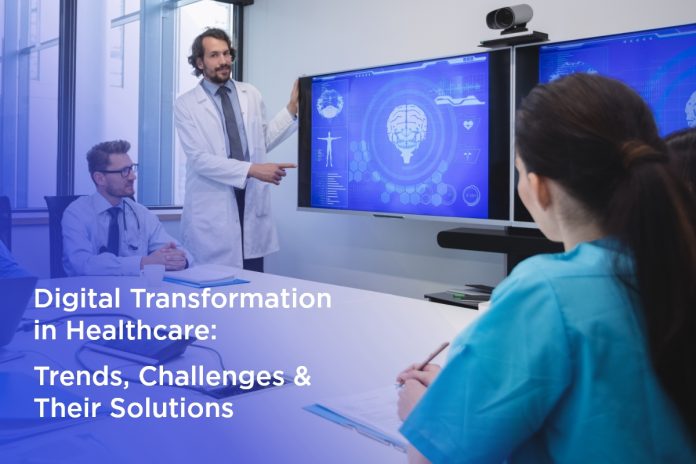With digital transformation in the healthcare industry, the main motive is to collaborate and innovate. That said, healthcare providers need to integrate scalable and high-performance solutions to enhance patient care. If you are into the healthcare business and are looking to adopt digital transformation for it, you are at the right place. Today, we are discussing everything about digital transformation in the healthcare industry.
Before we dive deep into the topic, know that statistics reported the total spend on digital transformation has already surpassed 1.3 trillion US dollars worldwide. The spending is only growing every year by almost 10.4%. That said, it is the right time to adopt digital transformation.
What is Digital Transformation in Healthcare?
Digital transformation in the healthcare industry uses the latest methodologies, technologies, and specific processes to deliver sustainable value to healthcare professionals, patients, and healthcare organizations.
Deloitte conducted a study recently, and it was concluded that almost 92% of healthcare professionals and the institutes obtained better performance and several benefits from digital transformation.
Though, if you are still in a dilemma whether digital transformation will be beneficial for your business or not, let us go over a few benefits of digital transformation to help you make an informed choice.
Digital Transformation has benefits both for the patients and the healthcare facility.
Benefits of Digital Transformation For Patients
Some of the significant healthcare advantages digital transformation offers to patients are listed below.
• Better & More Personalized Services
The implementation of digital transformation in the healthcare industry makes it possible for patients to get accurate health diagnoses. At the same time, it provides more effective, better, and more personalized healthcare services.
• Easy Access to Personal Health Data
Patients can easily access and manage their data and other reports related to their health with the data available online. Furthermore, they can also conduct a thorough analysis of the metrics available for their health online.
• Convenient Appointment Scheduling
With the help of digital transformation in the healthcare sector, patients can self-schedule appointments online with the doctors they wish to consult. This way they can choose a suitable time at a convenient date.
• Track Health Metrics in Real-Time
The use of advanced technologies like Healthcare Wearables, including a smartwatch, helps patients get to know their healthcare metrics and track their health status in real-time.
Benefits of Digital Transformation for Healthcare Organisations
Now that we have known that healthcare is beneficial for patients, it is beneficial for the healthcare facilities. Let us go over the benefits that it offers to healthcare organizations.
• Reduced Costs
The adoption of digital technologies enables automation in processes, which lets healthcare organizations and institutes offer better and cost-effective services. At the same time, it helps reduce and eliminate unnecessary spending on traditional healthcare services.
• Optimised Workflow
Digital transformation helps optimize an organization’s workflow to a great extent by replacing paperwork with digital records. Additionally, it reduced the examination time of patients and allowed easy access to the patients’ health records.
• Enable Improved Interaction with Patients
Digital transformation in healthcare facilities enables improved and more effective online interactions between the facility and the patients. They can interact through various mediums like online chats, video calls, etc.
• Secure Database for Electronic Medical Records
Digital transformation service in the healthcare industry enables businesses to create a secured and secure database for storing, encrypting, and accessing patients’ private medical records. It enables sharing all on-demand information related to healthcare laboratories, professionals, and medical specialists.
Digital Transformation Trends in Healthcare
1. AI
AI or Artificial Intelligence in the healthcare industry has numerous surpassing benefits for the healthcare industry. It speeds up the reading of test results, fast diagnosis and enables the industry to determine more effective and efficient pharmaceutical compositions. Additionally, it helps prevent the loss of identity and thus helps provide a compelling customer experience by reducing the risk of medical mistakes.
The use of AI is associated with reducing costs that people may have to incur in healthcare. Also, AI helps enhance decision-making capability, processing information, efficacy, and the speed of diagnosis. It helps doctors to provide better treatment and early therapy to the patients with the right approach.
2. AR/VR
Implementing virtual reality and augmented reality solutions for healthcare was considered sci-fi a few decades ago. Many were not aware of the benefits it would offer shortly. Such promising technologies enable healthcare professionals to test new practices and ideas before they implement them in reality.
AR and VR technologies help reduce the testing done on animals and expedite the trials that will be clinically done on humans. Besides training the students for surgery practices, AR and VR technologies can treat psychological traumas, opioid addictions, phobias, wound care, limb care, etc.
3. Wearable Technologies
Wearables are considered as one of the healthcare digital transformation trends. IoT helps collect all required data for the patients to provide them with a better healthcare approach. This trend will only continue to grow and there is no looking back.
Healthcare providers can employ the available data to research some advanced concepts related to the medical field. IoT or the Internet of Things is also used to prevent the massive epidemics of heath at a large scale, probably worldwide.
4. Chatbots
Most industries are already obtaining the benefits that chatbots have to offer, and the healthcare industry is slowly taking a few steps forward to implement this technology. It is just the beginning, but it has already started to look more promising. Statistica did market research in which the size of the chatbot market is expected to reach 125 million US dollars by 2025.
At present, there are two types of chatbots employed by the healthcare industry: the patient-only chatbot that helps gather patient data and the patient-clinician ones that serve as a connector between the patients and the facility. A digital transformation company will help implement this technology successfully.
5. Blockchain
The integrity and availability of information in the medical industry are critical, and blockchain technology is also implemented in the healthcare industry. It ensures easy and quick access to the patient’s records to everyone who has access to the database.
6. Big Data
In several scenarios, big data is used in healthcare. It helps reduce the spread of epidemics, collect the medical history for predictive analysis, reduce the cost incurred on medical expenses for the patients, create detailed records for the patients, etc. With the help of digital transformation services, business intelligence is added to the healthcare industry. It helps drive financial growth to the industry and provides the patients and physicians with advanced healthcare options.
Final Words
Digital transformation in the healthcare industry is evolving at an incredible pace. It has given rise to numerous healthcare services that improve outcomes and patient care. Also, the demand for patients is rising for better healthcare services, and to meet such expectations, the industry is adopting digital trends and technologies to cope with the same. That said, the industry cannot be sluggish and needs to keep evolving to stay competitive with other industries.









